How to Store Fresh Eggs for a Long Time

Table
of
Contents
Eggs
are
an
exceptional
superfood
and
the
cheapest
source
of
vitamins
in
the
market.
Therefore,
learning
how
to
store
eggs
is
as
essential
as
storing
flour
or
rice
for
long-term
emergency
purposes
or
in
case
of
a
disaster.
Eggs
are
among
the
most
nutritious
food
items
that
can
get
spoiled
easily
if
not
stored
correctly.
So,
if
you
want
to
know
how
to
store
fresh
eggs
long-term,
please
read
on…
How
Long
Do
Eggs
Last?

In
the
U.S.,
eggs
are
considered
the
most
nutritious
perishable
items
in
the
market.
Therefore,
they
are
always
kept
in
the
fridge
to
keep
them
fresh.
Eggs
can
last
for
a
very
long
time
when
stored
correctly,
so
throwing
them
away
after
they
have
reached
their
expiry
date
may
not
be
a
good
idea.
When
they
are
transported
and
stored
correctly,
eggs
can
last
for
a
couple
of
weeks
in
the
fridge.
They
can
last
even
longer
when
stored
in
the
freezer.
The
FDA
requires
that
the
store
keeps
them
at
a
temperature
of
about
45
degrees
Fahrenheit
from
the
time
they’re
washed
until
they
are
bought.
But
remember
to
store
them
correctly
after
purchasing
them.
The
faster
you
refrigerate
them,
the
longer
they
will
last.
This
can
prevent
condensation
buildup
that
plays
a
vital
role
in
the
movement
of
bacteria
into
the
eggs.
So,
you
should
store
them
in
their
original
carton,
even
when
in
the
refrigerator.
The
carton
will
protect
the
eggs
from
temperature
fluctuations
and
will
prevent
odor
absorption.
Generally,
eggs
can
last
for
about
five
weeks
after
their
packing
date
in
the
refrigerator
and
over
12
months
in
the
freezer.
How
Can
You
Tell
If
the
Eggs
Are
Still
in
Great
Condition?
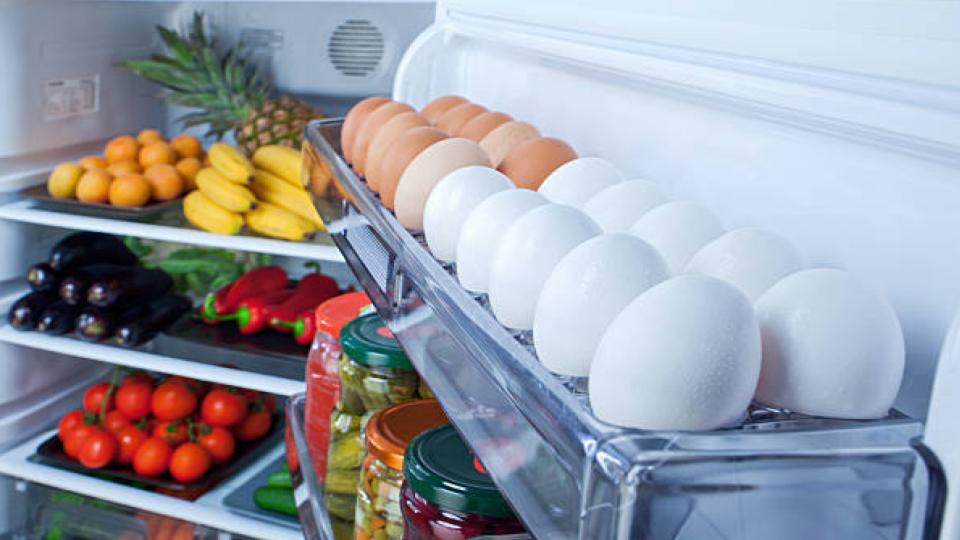
If
you
don’t
know
how
long
the
eggs
have
been
in
the
refrigerator,
then
you
shouldn’t
just
assume
that
they
are
spoiled.
Instead
of
throwing
them
away,
you
should
first
confirm
the
expiration
date
normally
printed
on
its
carton.
If
it
has
not
yet
expired,
then
you
have
nothing
to
worry
about.
Alternatively,
you
can
confirm
the
packaging
date.
The
pack
date
is
normally
the
3-digits
on
the
carton
that
correspond
to
the
day
they
were
packaged.
If
they
were
packaged
on
the
first
day
of
January,
it’s
normally
printed
001.
If
the
eggs
are
less
than
a
month
since
they
were
packaged,
they
are
in
excellent
condition.
The
eggs
can
still
be
in
good
condition
for
several
days
even
after
the
expiry
date.
Before
throwing
them
away,
do
a
sniff
test
first.
Before
you
do
this,
check
the
shells
for
slimy
or
powdery
appearance
or
cracks.
If
its
appearance
has
changed,
then
you
should
throw
it
away.
If
it
looks
okay,
you
can
crack
one
open
to
check
for
funny
smells
or
discoloration.
If
it
doesn’t
have
any
discoloration
and
smells
fine,
then
you
can
use
it.
If
it’s
contaminated
with
Salmonella,
the
egg
may
look
and
smell
normal
but
still
make
you
sick.
So,
you
should
cook
the
eggs
at
a
temperature
of
about
160
degrees
Fahrenheit
to
kill
the
bacteria.
How
to
Store
Fresh
Eggs
Long
Term
These
are
the
best
methods
you
can
use
to
store
eggs
for
a
longer
period
of
time.
Freeze
Dry
the
Eggs
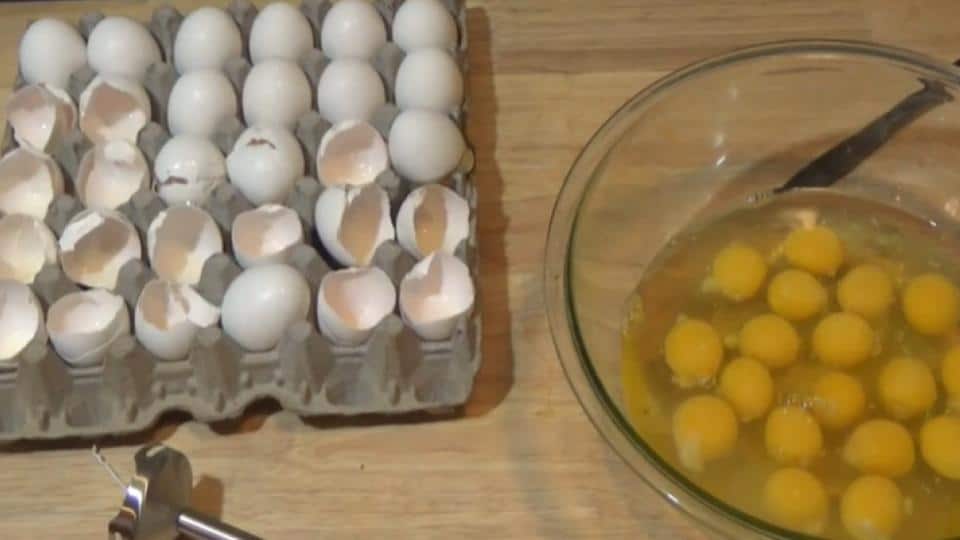
Freeze
dryers
are
pretty
costly,
but
they
can
be
an
excellent
investment
if
you’re
a
prepper.
A
freeze
dryer
can
store
any
food
for
as
long
as
10
to
25
years;
therefore,
it’s
the
best
solution
for
long-term
storage.
Every
food
that
has
been
stored
in
a
freeze
dryer
can
retain
over
97%
of
its
nutrients
while
maintaining
its
color
and
flavor.
A
freeze
dryer
allows
anyone
to
prepare
for
an
unexpected
disaster
that
can
lead
to
a
long-term
emergency.
Water
Glassing
Eggs
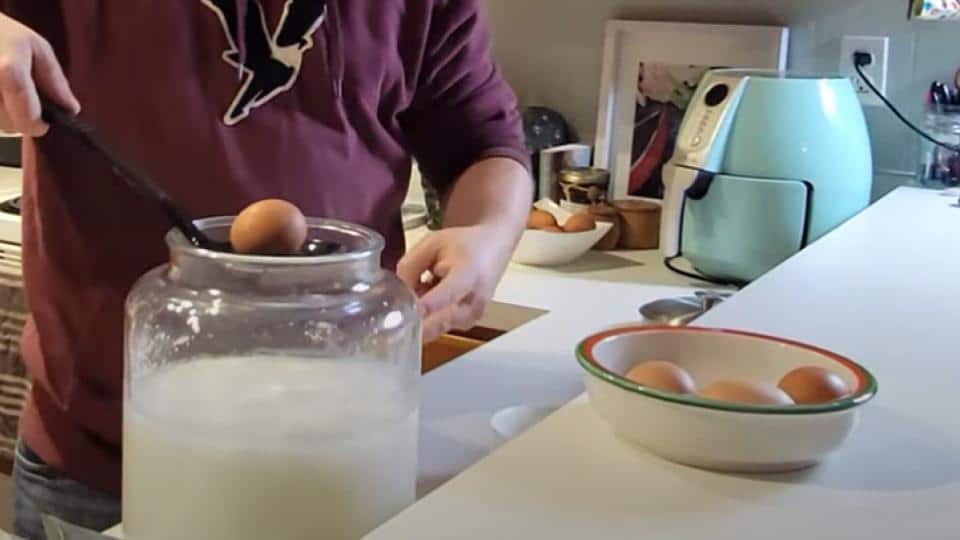
If
you
don’t
like
the
modern
methods
of
storing
eggs,
like
using
a
freeze
dryer,
you
can
try
water
glassing
them.
Water
glassing
is
an
ancient
method
for
preserving
eggs
to
keep
them
fresh
for
about
18
months.
But
the
longer
they
stay
in
the
solution,
the
runnier
the
yolk
and
whites
will
be.
The
best
water
for
storing
eggs
should
not
be
rich
in
minerals,
and
they
should
also
be
fluoride-
and
chlorine-free.
You
can
go
for
either
natural
spring
water
or
distilled
water
for
your
eggs
to
last
even
longer.
If
the
water
in
your
town
has
fluoride,
boil
it
first
and
then
let
it
cool
before
adding
the
eggs.
For
this
process,
you
should
do
the
following:
-
Add
5-ounces
of
lime
to
5-quarts
of
water
in
a
3-gallon
bucket
and
leave
more
than
enough
room
for
the
eggs.
Make
sure
you
add
an
equal
ratio
of
lime
to
water
to
your
bucket.
If
you’re
using
a
smaller
bucket,
you
can
try
2-ounces
of
lime
to
2-quarts
of
water. -
Mix
the
water
and
lime
until
the
lime
dissolves
completely. -
Next,
add
some
unwashed
eggs
to
the
solution,
making
sure
that
the
pointy
side
is
facing
upwards.
This
will
ensure
that
the
air
sac
remains
on
the
upper
side
of
the
eggs. -
Cover
the
bucket
with
a
lid
to
prevent
evaporating
and
store
it
in
a
cool
dark
place.
But,
make
sure
you
wash
the
eggs
as
soon
as
you
remove
them
from
the
bucket.
Dehydrating
Eggs
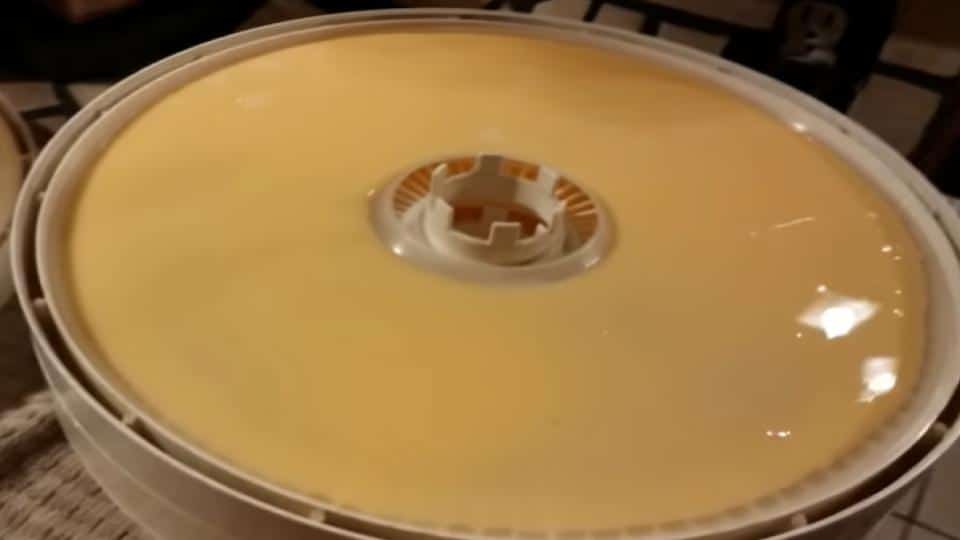
Another
reliable
method
that’s
been
used
for
years
is
dehydration.
Dehydrating
eggs
is
relatively
easy,
but
you
need
an
efficient
dehydrator.
Egg
powder
can
come
in
handy
when
making
baked
goods,
omelets,
and
scrambled
eggs.
To
dehydrate
the
eggs,
you
should
do
the
following:
-
Using
a
whisk,
you
can
whisk
all
the
eggs
you
plan
to
store
until
the
whites
and
the
yolk
blend
thoroughly. -
Line
your
dehydrators
with
a
fruit
leather
sheet
or
parchment
paper. -
Pour
the
scrambled
eggs
on
the
dehydrating
trays
and
then
set
the
dehydrating
temperature
and
drying
time.
The
entire
process
of
dehydrating
the
eggs
can
take
a
maximum
of
18
hours
to
dry. -
After
it
has
dried,
you
can
place
the
eggs
in
a
NutriBullet,
food
processor,
or
blender
and
grind
it. -
Finally,
you
can
store
the
egg
powder
in
glass
mason
jars,
but
don’t
forget
to
add
an
oxygen
absorber.
To
preserve
its
freshness,
you
can
vacuum
seal
your
mason
jars.
To
reconstitute
your
eggs,
you
can
mix
two
tablespoons
with
six
tablespoons
of
water.
But
you
don’t
have
to
always
mix
it
with
water.
You
can
add
it
directly
to
your
mixing
bowl
together
with
all
your
other
ingredients.
Freezing
Fresh
Eggs
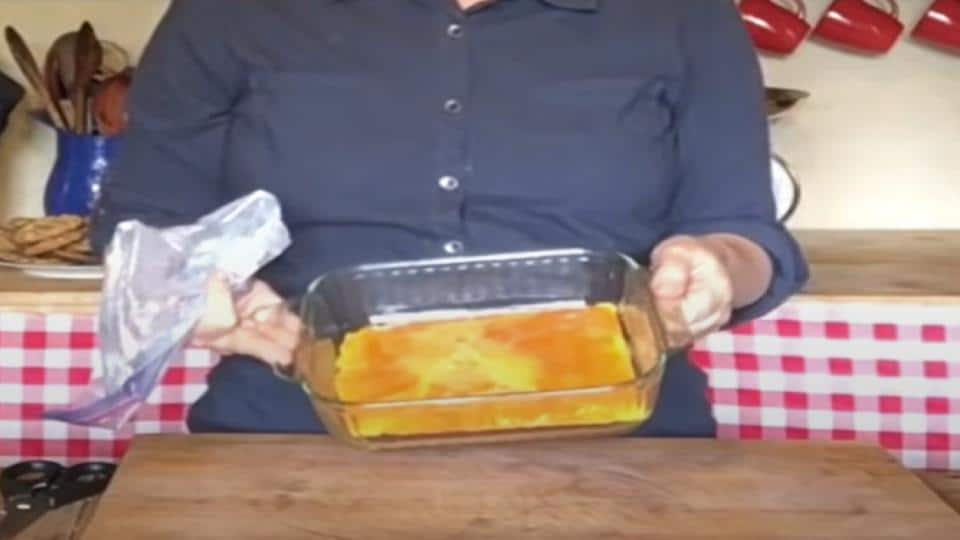
The
easiest
method
for
preserving
eggs
is
by
freezing
them.
You
need
a
freezer
container
and
some
huge
silicone
ice-cube
trays
for
this
method.
You
can
also
use
a
freezer-safe
Ziploc
bag,
but
vacuum-sealing
them
is
way
more
effective.
Vacuum-sealing
eggs
can
help
prevent
freezer
burns.
Before
placing
the
eggs
in
the
fridge,
you
should
do
the
following:
-
Since
most
recipes
require
you
to
use
only
two
eggs,
you
can
place
at
least
two
eggs
in
each
section
of
the
tray. -
Start
by
scrambling
two
eggs
at
a
time
using
a
hand
whisk. -
Pour
the
lightly
scrambled
eggs
into
the
tray
and
continue
until
your
tray
is
full. -
Next,
cover
your
tray
using
parchment
paper,
aluminum
foil,
or
plastic
wrap. -
Place
the
eggs
in
the
freezer,
and
once
they
are
frozen,
you
can
remove
the
eggs
from
the
tray
and
package
them
correctly. -
Simply
place
the
frozen
eggs
in
the
Ziploc
bags
and
put
them
in
the
fridge.
When
you
are
ready
to
use
the
eggs,
you
can
defrost
them
by
placing
them
in
a
bowl
of
water
at
room
temperature.
Also,
find
out
how
you
can
store
rice
long-term
and
check
out
our
tips
for
storing
sugar
for
a
long
time.
FAQs
How
long
will
an
unwashed
egg
last
in
the
fridge?
Storing
unwashed
eggs
in
the
fridge
can
increase
its
shelf
life.
Storing
the
unwashed
eggs
in
the
fridge
can
increase
their
shelf
life
by
up
to
3
months.
Remember,
washed
eggs
tend
to
lose
quality
and
moisture
sooner,
but
they
are
still
safe
to
eat.
How
long
will
an
unwashed
egg
remain
fresh
on
the
counter?
If
you
leave
your
unwashed
eggs
with
the
bloom
intact
on
the
counter,
you
should
expect
them
to
last
for
two
weeks.
So
if
you’re
not
planning
to
use
them
any
time
soon,
we
recommend
that
you
store
them
in
the
fridge.
Takeaway
An
egg
is
one
of
the
most
affordable
nutritious
foods
in
the
market
that
features
in
most
recipes.
If
you
keep
chickens
in
your
backyard,
you
need
to
learn
how
to
fresh
eggs
long-term.
After
all,
you
can
only
safely
consume
three
eggs
per
day.
Luckily,
there
are
ways
you
can
store
this
perishable
food
for
up
to
18
months
and
enjoy
it
in
case
of
a
disaster.
